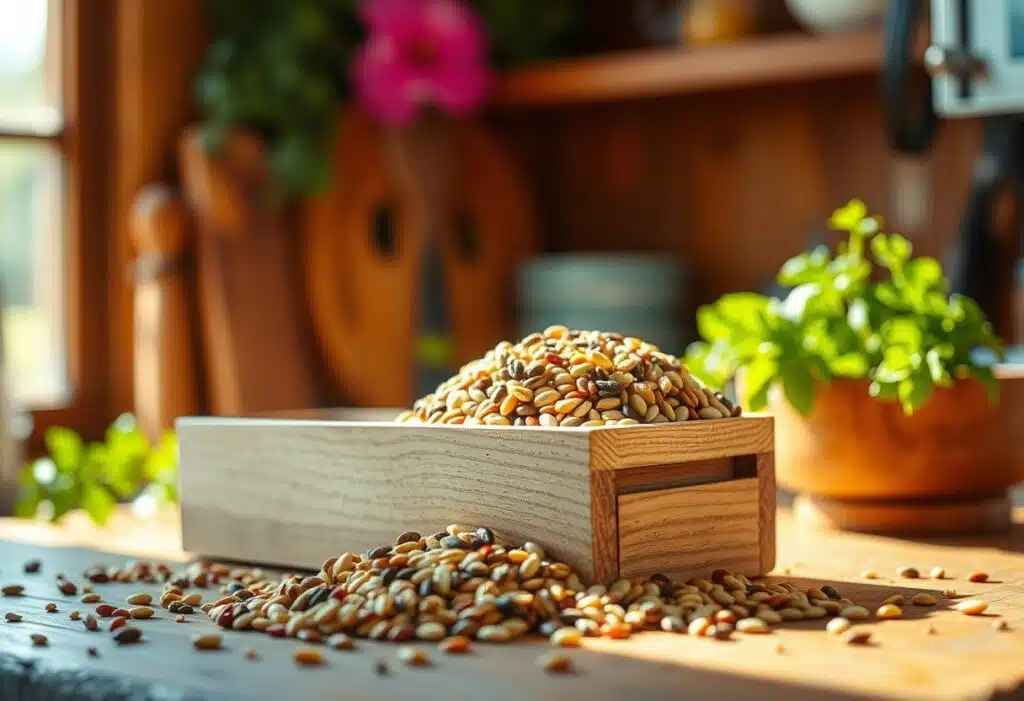How to Keep Bird Seed Fresh
You can ensure your The backyard is a perfect place for bird feeding activities. birds stay Store Properly: Keep your bird seed fresh and healthy for birds by following proper storage techniques. by learning how to keep bird seed fresh. Proper seed storage is vital to prevent spoilage, insects, and mold that can harm your feathered friends. By following some simple tips, such as using An airtight container is essential for storing birdseed to keep it fresh and healthy for birds.s and maintaining a cool storage location, you can make sure your bird food remains nutritious and appealing. With the right methods, you’ll keep your bird feeders filled with seeds that your birds can consume safely and happily.
Key Takeaways:
- Choose Fresh Seed: When buying bird seed, always look for fresh bags that are free of dust. This helps ensure birdseed is still nutritious and won’t spoil quickly.
- Store Properly: Keep your bird seed in a cool and dark area, ideally in an airtight container. Metal storage containers work great to keep out pests and keep your bird food fresh and healthy for wild birds.
- Check Feeders Regularly: Always check your bird feeders for any spoiled seed. It’s important to clean feeders often, especially after rain or snow, to maintain a fresh feeding environment for the birds in your backyard.

How to Store Bird Seed
The way you store bird seed can significantly impact its freshness and health benefits for the birds visiting your feeders. By following the right tips and techniques, you can keep your bird food fresh for longer, ensuring a consistent supply for wild birds unlimited. For more detailed strategies, check out 7 Easy Bird Seed Storage Tips and Ideas to Keep It Fresh. Proper storage ensures that wild birds can continuously access nutritious food when they visit your backyard.
Inspect Seed Bags for Dust
On your next trip to the bird seed store, take a moment to inspect the bags before purchasing. Avoid selecting bags that are dusty, as this can indicate that the seeds have been sitting for too long and may be close to spoiling. Fresh seeds not only appeal more to the birds but also keep your backyard feeding station vibrant and inviting for wild birds unlimited.
Choose the Right Storage Container
Clearly, selecting the right storage container is crucial to maintaining seed freshness. You should always store your birdseed in airtight containers, as this prevents exposure to moisture, pests, and air that can compromise the quality of the food.
Store your seed in large, sealed plastic bins or metal containers with tight lids. This type of storage will keep out unwanted pests like rodents and insects. Make sure to only store the amount of seed your feeders can consume within a reasonable time to prevent spoilage. Note, seeds with hulls, such as black oil sunflower seeds, are generally preferred as they last longer. It’s important to keep your bird seed in a cool, dark place to ensure that your food remains fresh and healthy for the birds.
Tips for Keeping Bird Seed Fresh
One of the best ways to ensure your bird seed stays fresh is by following these simple tips:
- Always store bird seed in a cool, dark place to maintain its quality.
- Use an airtight container to keep your birdseed fresh and prevent mold growth. airtight container to protect against moisture, insects, and rodents.
- Purchase only the amount of seed you need to minimize spoilage.
- Consider freezing seed for longer storage life.
- Regularly clean your bird feeders Metal storage containers work great to keep out pests and keep your bird food fresh and healthy for birds.
To prevent mold and bacteria growth, ensure your bird seed is stored in an airtight container.
For more detailed tips, visit How to Store Bird Seed and Keep It Fresh.

Keep It Cool and Dark
One of the most effective ways to preserve the freshness of your bird food is to store it in a cool and dark environment. Heat and light can significantly degrade quality, leading to spoilage. Ideally, keep your seed in a basement or a shaded area. This will not only help in maintaining the seed’s freshness and keeping your birdseed fresh but will also prevent mold growth, especially during warmer months.
Freeze Seed and Suet
Little do many bird enthusiasts know, freezing your excess bird seed and suet can extend their shelf life considerably. By sealing them in freezer-safe containers or bags, you can maintain their freshness longer and ensure that you always have quality food available for your feathered friends.
Cool temperatures can slow down the deterioration process of seeds and suet. Emma Greig from Cornell Lab suggests that seeds can keep for up to a year when stored properly in the freezer. This tip is especially beneficial during peak seasons when wild birds unlimited visits increase and you need to keep your feeders filled. Just remember to take out only the amount you need to avoid repeated thawing and refreezing to maintain quality.
Clean Bird Feeders Often
Seed accumulation in your bird feeders Mold and bacteria growth can lead to spoilage, so it’s crucial to monitor the conditions of your birdseed storage. To prevent this, it’s crucial to clean your feeders regularly with soap and water. A good practice is to perform a thorough cleaning at the start of each season.
Tips for cleaning your bird feeders include using a mixture of 9 parts water to 1 part bleach for disinfecting, ensuring they are ready for fresh birdseed storage. You should rinse well and let them dry completely before refilling. Keeping your feeders clean not only supports the health of the visiting birds but also ensures your seed remains safe and nutritious. Regular maintenance can save you from costly issues related to moldy or spoiled seed, allowing the birds in your backyard to thrive.

Key Factors in Bird Seed Management
All bird enthusiasts know that managing your bird seed effectively is vital for keeping your feathered friends healthy and happy. To ensure your seeds are as fresh as possible for wild birds in your backyard, consider these key factors:
- Inspect seed bags for dust and spoilage.
- Store bird seed in an airtight container to ensure it remains fresh and free from spoilage. cool, dark place to maintain freshness.
- Use airtight containers for seed storage to keep out pests.
- Monitor the freshness of seed regularly.
- Refill bird feeders often to provide fresh food.
- Handle moldy seeds properly to prevent health risks.
Assume that following these tips will keep your bird food fresh and nutritious, ensuring your birds consume only the best. For more detailed advice on storing your birdseed, check out How to Store Your Birdseed to Keep it Fresh.
Monitor Seed Freshness with Smell
There’s no better way to check if bird seed has gone bad than by using your sense of smell. Spoiled seed often emits an unpleasant odor, indicating that it’s no longer suitable for your birds. Regularly checking the scent of your stored seeds will help you discern when it’s time to replace them, ensuring the health of your feathered visitors.
Refill Feeders Regularly
The key to keeping your birdseed fresh is taking the right tips for storing bird seed to prevent mold and bacteria growth. Regularly checking your feeders allows you to monitor seed levels and prevent your birds from going hungry. Additionally, it helps you keep an eye on the freshness, as older seed may spoil or attract pests.
Understanding the feeding habits of birds can inform how often you should refill your bird feeders. With traffic from birds consistently cleaning out the feeders, it can be helpful to replenish food every few days, especially during peak feeding times. Keeping your feeders full not only attracts more birds but also promotes their overall health by providing them with fresh food.
Handle Moldy Seeds Properly
Monitor your stored seeds closely for any signs of mold. Mold can be harmful to birds, causing health issues when consumed. If you spot any moldy seeds, discard them immediately to keep other seeds safe and ensure they remain fresh and healthy for birds.
Seed that has developed mold should be thrown away promptly, as it can contaminate the remaining fresh seed and pose serious health risks to birds. Proper seed storage and maintenance practices will help in preventing spoilage and ensuring that you provide safe food sources for the birds visiting your backyard. It’s crucial to replace any spoiled seed with fresh, high-quality birdseed to maintain a healthy environment for your avian companions.
Final Words
Conclusively, keeping your bird seed fresh is important to provide healthy food for the wild birds in your backyard. Always buy fresh seed from a reputable bird seed store and store your seed in a cool, dark place. Invest in airtight containers to prevent spoilage and infestations. Remember to clean your bird feeders regularly to keep the food nutritious and appealing. By following these simple tips for storing birdseed, you can ensure that your birds stay fresh and healthy while enjoying their visits to your feeders.
FAQ
Q: What is the best way to store bird seed at home?
A: To keep your bird seed fresh, it’s important to store it properly. First, choose an airtight storage container, like a metal can with a tight lid or a sturdy plastic bin. Make sure the container is kept in a cool, dark place away from direct sunlight and humidity. This will help prevent spoilage and keep pests out. It’s also a good idea to only buy the amount of seed that you can use in a reasonable time. And remember, always inspect your seed bags for dust before buying to ensure they are fresh!
Q: How often should I clean my bird feeders to keep the seed fresh?
A: Cleaning your bird feeders regularly is key to maintaining fresh seed. A good rule of thumb is to clean them at least once with every new season. If you have feeders for hummingbirds, they should be cleaned every week during peak feeding times. Use a mixture of soap and water, or a mixture of vinegar and water, to scrub away residue and bacteria from your backyard bird feeders. Rinse well and allow the feeder to dry completely before refilling it with fresh bird seed in small amounts to maintain quality.
Q: How can I tell if my bird seed has spoiled?
A: Spoiled seed may have a strange or musty odor, which is a sign that it might be moldy. You can also perform a quick sniff test—if it smells off to you, it will likely smell unappealing to the birds as well. Additionally, check the seed for signs of pests like small black bugs or clumps of mold. Always trust your nose and eyes; it’s better to discard questionable seed than to risk the health of the birds visiting your backyard.
As a bird enthusiast with a passion for sharing the wonders of our feathered friends. As a writer and nature lover, I'm thrilled to connect with fellow bird buffs and inspire others to take flight into the fascinating world of birds. Let's wing it together!


